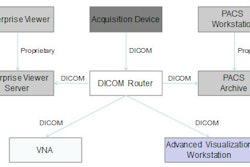Lunches at expensive restaurants. Tickets to sporting events. Doughnuts delivered daily to key IT staff. These are just a few of the sales techniques employed by Extormity, the pioneering healthcare IT software developer that's making waves -- and cash -- in its march to meaningful use nirvana.
This innovative healthcare IT company, known for its highly complex, very expensive electronic health record (EHR) solutions for both hospitals and physician practices, has been so successful that it eschewed exhibiting at the recent Healthcare Information and Management Systems Society (HIMSS) annual meeting at Orlando's Orange County Convention Center. Instead, Extormity executives held court at the nearby Peabody Hotel, where an intrepid AuntMinnie.com reporter caught up with CEO Brantley Whittington.
Amid tables overflowing with caviar, fois gras, and champagne, Whittington explained the secrets to Extormity's success in an exclusive interview. The takeaway message? "Meaningful use" is magic.
The selling process
The Extormity sales team prides itself on its ability to analyze the needs of a potential customer, with respect to the electronic health products it should purchase and the products that are actually required.
To learn about the inner workings of a hospital or physician practice, Extormity retains the consulting firm of Sludge, Prodd, Ponder & Pierce, a corporate investigation firm headquartered on Stretch Island in Grapeview, WA. From this impenetrable location, Sludge's staff analyzes the corporate culture, financial stability, C-level politics, income tax statements, and individual personal proclivities of the pillars of purchasing and decision-making in the healthcare organization.
Extormity leverages this information to custom-craft its sales pitch. Sales tools include daily doughnuts delivered to the IT staff, loaded laptops left on IT workbenches, and tickets and transportation to events in local sports arenas. C-level executives are wooed with tales of decimating the competition once they've acquired Extormity's products, and with customer site visits to locales like St. Moritz, Tortola, Las Vegas, and Fiji via Extormity's corporate jet.
Promotional literature routinely includes impressive gift certificates tucked inside from the restaurants that these executives frequent, or would like to frequent. For some, an unexpected visit by a Joint Commission "representative" does the trick, or when an "investigator" from the fraud unit of the Centers for Medicare and Medicaid Services appears on the doorstep.
"It's important to impress and gain the respect of our potential clients," Whittington explained. "If they know that we lavish money on them, they will be comfortable about lavishing money on us ... into perpetuity. What implies greater corporate stability for a Chicago-area customer: a lunch at Carrabba's or a lunch at Spiaggia? Extormity and the products we sell are all about appearance, and through the good work of Sludge, we identify sales prospects who compulsively relate to this attribute."
If these methods fail, Extormity can take a more, well, personal approach.
"If you can't impress 'em, but you've got the goods on them, you leverage that in the most meaningful way possible," he boasted. "When there's been a messy divorce by a senior-level executive or board member at a conservative hospital, we may hire the ex to join the sales team for a short-term gig. You'd be amazed at the contribution this individual can make."
The contract
Once the big fish is landed, Extormity believes that its contract language is the most astute in the industry. Here's an example of boilerplate text incorporated in a quote for Extormity's software-as-a-service (SaaS) hospital EHR or the Trophy EHR for physician practices:
By receipt of this quote, the customer acknowledges and agrees that the pricing and product configuration contained herein are confidential in nature. As such, it cannot be shared with any other party, including but not limited to an affiliate of customer, without Extormity's prior written consent.
In addition to Extormity pursuing all remedies available to it in law, in the event customer violates the terms of this provision, this quote shall immediately terminate. If customer has entered into an agreement with Extormity for the purchase of the above referenced products and/or services, the foregoing pricing shall be null and void. The customer will be required to pay an amount equal to the list price of the products or services."
What this means, Whittington explained, is that sharing the information with a healthcare IT consultant or attorney legally binds the potential customer to purchase the system at list price, even if the quote is for a 30% across-the-board discount.
Overloaded service contracts
The language used in Extormity's contracts reflects its corporate motto: expensive, exasperating, exhausting. Service contracts contain hard-to-read font in 8-point type and carefully designed graphics that create the visual confusion of a tornado-swept landscape. So it's not difficult to overlook inconsistencies in an Extormity contract, such as selling a 36-seat software license while charging service and upgrade fees for an 86-seat one.
Extormity uses other creative sales techniques that sometimes aren't fully appreciated by its customer base. One user wanted to know how the firm had the "you know what" to charge $38 per month for a medical dictionary software package for 12 license seats that could be purchased from an Amazon store for $99 with three user licenses. The customer's contracts officer calculated that that the practice had paid $2,736 over six years, and would ultimately pay an additional $1,824 for the remaining four.
"He pointed out that he could have purchased everything outright for $300. Well then, he should have," Whittington noted with exasperation.
Outsourced technical support
For customers who are too cheap to pay Extormity for extended training packages and extended service warranties, Extormity maintains a list of local technical support companies it locates through Internet searches and Google ads. But Whittington warned that this could be risky.
One customer, he reported, was a busy seven-physician family medicine practice. The practice purchased an Extormity EHR at the end of 2006 after an extensive search, swayed by the presumption that the cost of the hardware and software was indicative of its performance. The practice bought software and hardware without purchasing Extormity's pricey installation package, and selected a local tech support company to install the system and oversee daily data backup.
The practice went live in January 2007 without a glitch. For the next three months, each of the physicians spent an average of three hours nightly with the paper charts of the appointments for the following day, entering clinical data into the EHR. Five clerical staff worked overtime an extra two hours daily entering medication lists, allergies, and past test and vaccinations. Patient visits were reduced by 20% to accommodate the workload. By April, the practice was back to full speed and had resumed its normal patient volumes.
In January 2008, the next software version was available for download. After the practice's part-time IT manager failed to successfully install the upgrade, Extormity's customer support desk suggested that the company remotely access the server to install the upgrade in the evening hours.
The morning after the upgrade was scheduled, the office staff discovered that there was no EHR anywhere on their computers. No clinical histories, records of childhood vaccinations, prescriptions, results of laboratory or diagnostic tests -- nothing! The EHR had vanished.
What happened? A newly hired IT technical support specialist tried to install the upgrade, but failed because of the way that the original software had been configured when it was installed. Somehow, he had corrupted all patient data in the process.
Having forgotten to perform a backup before the start of the upgrade, he telephoned the manager of the local tech support company, using the telephone number he had on file, and left a voicemail message because the office was closed. He advised that the prior day's backup needed to be retained for file restoration. Although the practice's part-time IT manager had a unique name, and a home phone number could be obtained through directory assistance, the technician never called that telephone number.
When midnight struck, the corrupted database overwrote the previous backup. When the practice contacted its local tech support company, it learned that no one had set up the offsite secondary backup. When it sent the hard drives to a company specializing in data restoration, the practice was advised that reassembling data would be like putting back together a shattered windshield after a head-on collision.
The physician practice lost a slew of patients but stuck with Extormity, even though Extormity made no compensation because the employee had, in fact, notified the customer in a timely manner. The practice had invested so much time and effort into learning to use the complex, labor-intensive system that its members could not bear the thought of starting from scratch and learning a new system.
Besides, an attorney they retained to scrutinize the contract they had signed discovered that the service contract was in effect for the next four years, regardless of whether they continued to use the product or not.
The moral of this story for Extormity and like-minded EHR vendors?
"We can make empty promises, fail to deliver on them, disrupt practice workflow and revenues, disappoint patients, and generally make life miserable for all concerned -- and still retain the business. As we say at Extormity, there is no better client than an unhappy captive," Whittington commented with a grin.



















